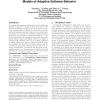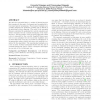1166 search results - page 171 / 234 » Negotiating Using Rewards |
110
Voted
GECCO
2008
Springer
15 years 3 months ago
2008
Springer
Increasingly, high-assurance applications rely on autonomic systems to respond to changes in their environment. The inherent uncertainty present in the environment of autonomic sy...
94
Voted
GECCO
2008
Springer
15 years 3 months ago
2008
Springer
We introduce potential fitness, a variant of fitness function that operates in the space of schemata and is applicable to tree-based genetic programing. The proposed evaluation ...
123
Voted
CEC
2010
IEEE
15 years 2 months ago
2010
IEEE
Abstract— In Evolutionary Robotics (ER), explicitly rewarding for behavioral diversity recently revealed to generate efficient results without recourse to complex fitness funct...
116
Voted
AR
2007
15 years 2 months ago
2007
—Reinforcement learning is the scheme for unsupervised learning in which robots are expected to acquire behavior skills through self-explorations based on reward signals. There a...
119
Voted
JMLR
2008
15 years 2 months ago
2008
This paper presents the dynamics of multiple learning agents from an evolutionary game theoretic perspective. We provide replicator dynamics models for cooperative coevolutionary ...


